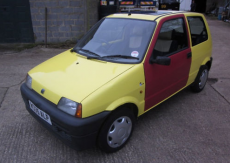
Want to get your first set of wheels? Obviously, you have to get driving lessons, and pass the driving test. This means applying for a provisional licence, and the earliest you can do this is aged 15 years and nine months in the UK. There are two types of test: practical and theory. Although you can study for your theory test, you can’t sit it until your 17th birthday at the earliest. There is a lot of software on the web or that you can buy to help with the theory test, including from the Government itself. You can find this at the attached link: https://www.gov.uk/practise-your-driving-theory-test
Next, driving lessons! These are usually taken in one or occasionally two hour sessions once a week, and when you get nearly ready, your instructor will tell you to apply for your test. It is important to get an instructor you are comfortable with, so if you don’t like them don’t hesitate to switch to another. For this reason, it is best not to pay for a big block of lessons before you’ve even had one with that instructor. In addition, if you are lucky your parents or older brother/sister will help out here, as they’ll take you out for practice sessions between official lessons, which helps immensely.
An alternative to weekly lessons would be an intensive course, which may or may not be cheaper. You would do hours and hours of practice, but if you’re good you’ll pass your test very quickly. But the downside of this course is the lack of practice outside lessons. However, the choice is yours.
So, once you’ve passed your test, you need a car. Some people are put on their parents insurance, and borrow the car occasionally. Others have to save up for a car of their own and all the expense that the car entails. Most start off with an old car as these are cheapest to buy, but the key thing here is to check the cost of the insurance for a new young driver on various models of car before buying. That’s because some cars cost thousands more to insure per year than others. Your first car won’t be a Ferrari, but you may be surprised to learn that a small Peugeot is cheaper by about 50% to insure than the same sized Vauxhall. “Black boxes” which monitor driving and send the information to the insurance company can also reduce insurance costs for young drivers. So can “Pass Plus”, which is basically a 2 hour post driving test lesson to teach you to drive on motorways, drive in all weathers, drive at night etc.
Cars over 3 years old need an MOT, which means the car has passed to certain standards at a registered test centre. This is valid for a year, but it doesn’t mean the car is safe for a year as something could go wrong the day after it is tested. So, never buy a used car without a full year’s MOT, and you will have trouble selling your car without getting one as time goes on. When buying a used car, take someone knowledgeable about cars if possible, and if you can’t do that then do all the research possible on the internet first. You also need Road tax for your car. This varies depending on car but is likely to be between £100 and £300 per year.
Owning a car costs money, but it’s worth it. It’s a valuable skill that many jobs require.
Image from: http://cars.aol.co.uk/2011/03/11/inbetweeners-car-goes-up-for-sale-on-ebay/

0 Comment:
Be the first one to comment on this article.